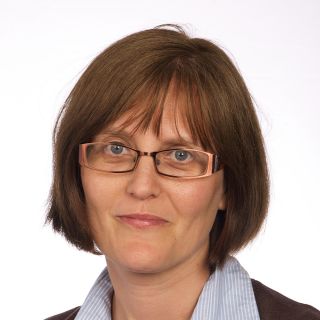60 seconds with Francesca Buffa

Francesca is Associate Professor of Computational Biology and Integrative Genomics in the Department of Oncology, the Academic Lead of the Bioinformatics Hub and the recipient of a European Research Council Award.
In this interview she gives us an insight into her research and explains how this translates into strategies that can be used to tackle treatment resistance.
My lab is interested in genomics - the study of genes and their function - and computational approaches that help us understand cancer as a complex system. In particular, we search for gene ‘signatures’ that enable us to predict the likelihood of an individual cancer to progress, and what subsequent therapies are likely to be most appropriate.
Ultimately, we want to understand how normal cells rewire their molecular circuits to become cancer cells, and what factors determine tumour progression and response to treatment. We know that the microenvironment in which cancer cells grow is a major factor. This microenvironment is often characterized by low oxygen levels (hypoxia), to which cancer cells adapt. We investigate how cells re-wire their molecular networks in response to hypoxia, and how hypoxia selects for specific gene ‘signatures’ which cause the cancer to grow and become resistant to therapy. This information will help us understand which treatment is likely to be most effective for each individual tumour, and how we target or exploit the microenvironment to develop novel cancer therapies.
What are the implications of your research?
The role of the tumour microenvironment in determining progression and response to treatment is increasingly recognised in many cancer types, but our understanding of how this occurs is still limited due to the complexity and heterogeneity of the interactions involved.
My lab is funded by Cancer Research UK and the European Research Council to develop strategies to unravel this complexity. This work will help us to shed light on the evolution and behaviour of a heterogeneous population of cells interacting in a changing microenvironment, and generate virtual models of real tumours using data collected from a diagnostic biopsy. This will then facilitate in-silico experimentation to identify likely resistance mechanisms, predict effective therapeutic strategies, and help to identify drugs for cancers that are currently incurable.
How is computer science used within your work?
Computer science is a key element of my research. It gives us power to organize large amounts of genomic data in order to understand cancer complexity. My group develops and adopts approaches that use machine learning, a branch of artificial intelligence exploiting advanced statistics to learn from previously acquired data, in order to make predictions for new cases. We use it to answer both basic questions and to derive clinically useful tools. For example we can discover function of yet uncharacterised genes, understand which genomic aberrations drive cancer progression, and which gene signatures predict response to treatment.
As well as being a Principal Investigator, you’re also the Head of the Bioinformatics Hub Training Platform, what does this entail? Have you got any exciting events coming up?
We often hear the words Big Data in biomedical sciences today. This refers to the large volume and new types of information that new and powerful high-throughput technologies are providing us with. Although this provides a fantastic opportunity to understand and defeat complex diseases such as cancer, we are currently producing far more data than we can handle. This is due to a lack of scientists who have the skills and knowledge needed to analyse and interpret these data. The Bioinformatics Hub Training Platform aims to address this problem. We organize both taught courses and discussion groups to learn, share expertise, and discuss analysis of biomedical data. We aim to educate students, postdoctoral scientists, medical researchers and investigators working in the biomedical domain to become the next generation of data scientists.
I was able initially to establish my research group through a CRUK career development fellowship. I was then able to establish my lab with the help of CRUK young investigator and ERC consolidator awards. To obtain external support in order to translate your own scientific ideas into results that have a broader impact is a crucial step, and a very exciting one!
I was also extremely fortunate to have great mentors along the way who have provided both scientific stimuli and support to develop my own research. They have also helped to teach me resilience and persistence, which are essential survival skills in research enabling transformation of obstacles into growth opportunities.
Big open questions in cancer research are 1) how cancer evolves, 2) how the host environment shapes this evolution, and 3) which cancer will respond to which treatment. In terms of treatment, we know that most therapeutic strategies targeting single gene mutations have not worked as well as anticipated. On the other hand, functional genomics research is now at an exciting new stage: we have powerful tools, such as CRISPR technology and sequencing, which we can use to understand the function of whole genomes and study cancer as a complex system. So in the next ten years I believe we will see a surge of new strategies that treat cancer as a heterogeneous and evolving disease, in communication with the host environment. This will include both the design of new therapies, but also an intelligent combinatorial use of those already existing.

